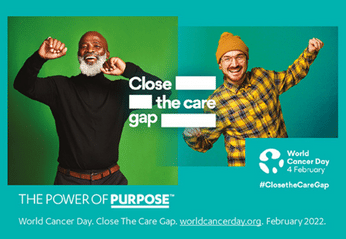Three moments where we can make waves in oncology this year
This article first appeared on LinkedIn on February 4 2022
“New year, new job” – the phrase does not quite apply to me, as I actually started my new role as the Oncology Therapy Area Leader, EMEA at Janssen last October. But after a whirlwind first couple of months, it feels like 2022 is a chance to look forward with fresh eyes and think about the job ahead, not just for myself but for all of us in the oncology community.

We have to keep working with a renewed sense of purpose, to overcome the disruption of COVID-19 and to achieve our objective: to make cancer a manageable and, ultimately, curable condition.
I believe that 2022 will show, as 2021 did, that incredible work is being done to drive us towards this. This year’s line-up of medical congresses – which will once more bring experts together both physically and virtually to translate the science and outline a pathway towards reflecting this in clinical practice – will no doubt continue to inspire me, even in my second decade working in the field of oncology.
Equally important will be the disease awareness milestones throughout, which not only provide a chance to publicly reinforce our commitment to changing what it means to have and treat cancer, but also hear from the people most affected about what progress means to them.
Here are three examples that jump to mind, and that will provide us all with a chance to make waves in our ‘new job’:
1) World Cancer Day
"Closing the care gap’[1] is the theme of this year’s World Cancer Day on the 4th February.
Every year, this day brings an invaluable opportunity for the wider oncology community, including people living with cancer and their families, to come together and participate in a conversation that extends beyond the research. Given the extreme pressures brought by the ongoing COVID-19 pandemic, it is fitting that in 2022 the theme closely links to the impact health systems as a whole play on cancer care.
The ongoing COVID-19 pandemic has put increased pressure on these systems, with cancer patients being disproportionately impacted.[2] Now more than ever, bringing together stakeholders from across the care spectrum is critical to addressing the issues facing patients. At Janssen I’ve had the priviledge of working alongside some incredible patient advocacy groups, who have shared the experiences of their members and helped us evolve our approach to better serve patient needs. World Cancer Day provides us with a moment to renew these efforts, and see how we can continue translating the science into better outcomes for patients.
2) ASCO Genitourinary Cancers Symposium (ASCO GU) Conference
We know that the greatest challenges in health cannot be solved by one sector alone. That’s why congresses such as ASCO GU in February, which bring the many stakeholders across the spectrum of urology together, are so important.
From world-class science to patient-centred care, the presentations at this year’s ASCO GU will yet again deliver innovative and exciting findings that will impact the way we study, diagnose and treat genitourinary cancers.
What’s more, change can only come through collaboration and congresses like ASCO GU, which can spark new conversations and alliances, are a springboard for this as we continue to tackle the high unmet need that remains in bladder and prostate cancer, where delayed diagnosis can have a profound impact on life expectancy. [3][4]
3) Bladder Cancer Awareness Month
In 2020, over 200,000 new cases of bladder cancer were recorded in Europe.[5] Delayed diagnosis has been shown to be a major contributing factor to poor outcomes for people with bladder cancer and we must continue to raise awareness and drive earlier diagnosis.ii Bladder Cancer Awareness Month in May provides an opportunity to do this and raise awareness around the symptoms of the disease, and the benefits of earlier detection.
By joining with the wider community and equipping people with the knowledge and the best resources to identify symptoms or navigate their diagnosis, we can play our part in improving outcomes for people with bladder cancer. By listening to their experiences, we can better understand what is important to them and strive to find treatments that not only increase life expectancy but also quality of life.
The clearer we hear the voices of those most affected by bladder cancer, the more we collaborate with them, the more tangible an impact we can make on the treatment options available.
--
Working in oncology for over 10 years I was fortunate to witness great strides. I’m optimistic that, despite the challenges posed by Covid-19 in recent years, 2022 will provide another opportunity to target cancer with a renewed purpose as we work towards a cure.
Whether it’s allying with multiple stakeholders to discuss solutions to addressing the care gap, or presenting our latest data at a congress, we at Janssen will continue to break new ground in our efforts to revolutionise long-term patient outcomes in oncology. I can’t wait to get continue it alongside all of you in 2022!
This article first appeared on LinkedIn on February 4 2022
References
[1] worldcancerday.org - World Cancer Day Homepage 2022 – Website. Available at: https://www.worldcancerday.org/ Last accessed: January 2022
[2] WHO. Statement – Catastrophic impact of COVID-19 on cancer care. Available at: https://www.euro.who.int/en/media-centre/sections/statements/2021/statement-catastrophic-impact-of-covid-19-on-cancer-care. Last accessed: January 2022.
[3] ECPC. Bladder cancer patients call for action and awareness. [Online]. Available at: https://pr.euractiv.com/sites/default/files/pr/PRESS%20RELEASE%20-%20ECPC%20-%20Launch%20of%20Bladder%20Cancer%20Awareness%20Month%20-%20May%202nd%202018.pdf. Last accessed: January 2022.
[4] The National Cancer Institute. Cancer Stat Facts: Prostate Cancer. Available at: https://seer.cancer.gov/about/contact.html. Last Accessed: January 2022.
[5] IARC. Online analysis table. Available at: Cancer Today (iarc.fr). Last accessed: January 2022.



